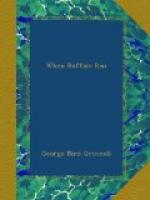[Illustration: Watch the men and older boys playing at sticks]
I remember another thing—a sad thing—that happened when I was a very little boy.
It was winter; the snow lay deep on the ground; a few lodges of people were camped in some timber among the foothills; buffalo were close, and game was plenty; the camp was living well. With the others I played about the camp, spinning tops on the ice, sliding down hill on a bit of parfleche, or on a sled made of buffalo ribs, and sometimes hunting little birds in the brush. All this I know about from having heard my mother tell of it; it is not in my memory. This is what I remember: One day, with one of my friends, I had gone a little way from the camp, and down the stream. A few days before there had been a heavy fall of snow, and after that some warm days, so that the top of the snow had melted. Then had come a hard cold, which had frozen it, so that on the snow there was a crust over which we could easily run.
As we were playing we went around the point of a hill, and suddenly, close to us, saw a big bull. He seemed to have come from the other side of the river, and was plowing his way through the deep snow, which came halfway up to the top of his hump. When we saw the bull we were a little frightened; but as we watched him we saw that he could hardly move, and that after he had made a jump or two he stood still for a long time, puffing and blowing, before he tried to go further. As we watched him he came to a low place in the prairie, and here he sank still deeper in the snow, so that part of his head was hidden, and only his hump showed above it. My friend said to me, “Let us go up to this bull, and shoot him with our arrows.” We began to go toward him slowly, and he did not see us until we had come quite close to him, when he turned and tried to run; but the snow was so deep that he could not go at all; on each side it rose up, and rolled over, away from him, as the water is pushed away and swells out on either side before a duck that is swimming. My friend was very brave, and he said to me, “I am going to shoot that bull, and count a coup on him”; and he ran up close to the bull, and shot his blunt-headed arrow against him, and then turned off. The bull tried hard to go faster, but the snow was too deep; and when I saw that he could not move, I, too, ran up close to him, and shot my arrow at him, and the arrow bounded off and fell on the snow. Again my friend did this, and then I did it; and each time the bull was frightened and struggled to get away: but the last time my friend did it the bull had reached higher ground, where the snow was not so deep, and he had more freedom. My friend shot his arrow into him, and I was following not far behind, expecting to shoot mine; but when the bull felt the blow of the last arrow, he turned toward my friend and made a quick rush; the snow was less deep; he went faster; my little friend slipped, and the bull caught him with his horns and threw him far. My friend fell close to me, and where he fell the snow was red with his blood, for the great horn had caught him just above the waist, and had ripped his body open nearly to the throat.




